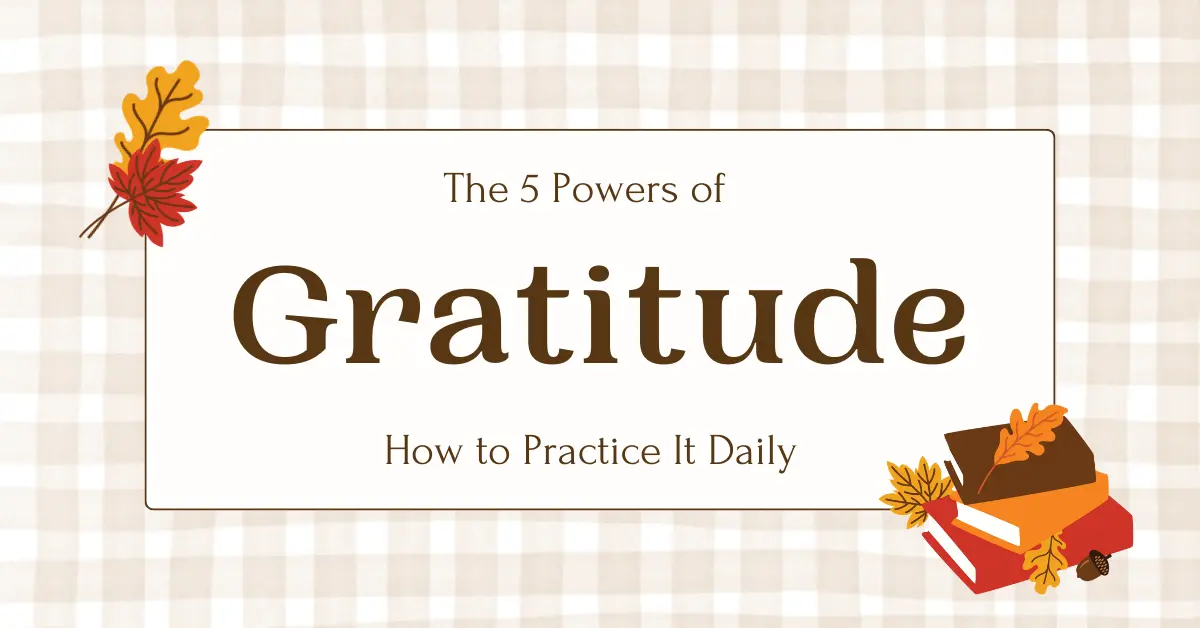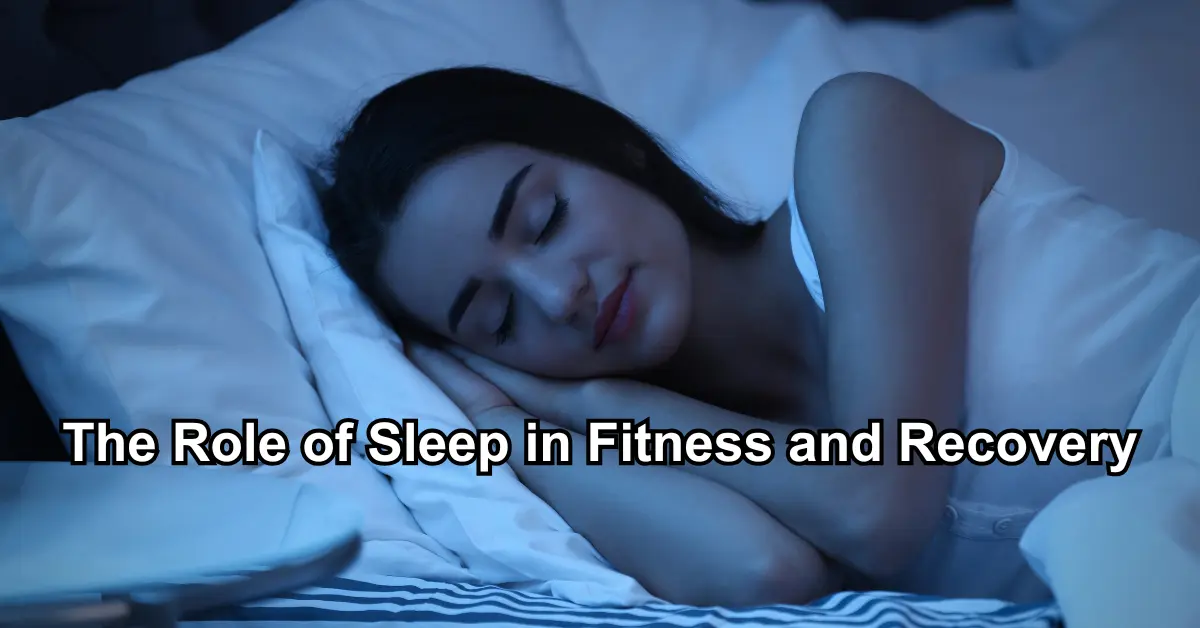
Sleep plays an essential role in fitness and healing. During sleep, the body repairs muscles, tissues, and joints, helping them recover after exercise. It also boosts energy, improves mood, and balances hormones that control hunger and muscle growth. Quality sleep boosts physical performance, stamina, and mental focus, leading to more effective workouts and faster recovery. In contrast, sleep deprivation causes fatigue, reduced coordination, and slower muscle repair, hindering fitness progress. Therefore, aiming for 7-9 hours of restful sleep each night is vital for those looking to build strength, stay fit, and lead a healthy lifestyle.
The Role of Sleep in Fitness and Recovery
If you’re striving to improve fitness and build strength, exercise and diet might be your main focus. However, there’s another essential factor: sleep. Quality sleep is vital for progress and recovery. Here’s why it matters and how it can enhance your results.
Why Sleep Matters for Fitness

Your body doesn’t just relax during bedtime – it’s hard at work restoring and rebuilding. Here’s what happens while you sleep and the role of sleep in fitness and recovery:
1. Muscle Recovery and Growth
Exercise causes small tears in your muscle fibers. During deep sleep, the body releases growth hormones that repair these tiny tears, strengthening your muscles. Quality sleep is essential for this healing process, aiding muscle recovery and overall fitness progress. Without enough sleep, this repair process can’t happen properly, which means your workouts won’t give you the results you want.
2. Energy Restoration
Sleep recharges your energy stores, particularly glycogen in your muscles. This is the power you require for your next workout. Poor sleep leaves you with low energy levels, making it harder to exercise effectively.
3. Better Performance
Analyses show that athletes who get sufficient sleep:
- React faster
- Have better accuracy
- Can exercise longer
- Make fewer mistakes
- Have better coordination
4. Weight Management
Sleep impacts the hormones that regulate hunger and fullness:
- The absence of sleep raises ghrelin (the hunger hormone)
- It decreases leptin (the fullness hormone)
- This means when you’re tired, you’re more likely to overeat
- Insufficient sleep can make it more difficult to lose fat and keep a healthy weight
How Much Sleep Do You Need?
The amount of sleep you need depends on how active you are:
- Regular adults need 7-9 hours
- Athletes often need 8-10 hours
- During intense training periods, you might need even more
- Hear to your body – if you’re training challenging and feel exhausted, sleep more
Signs You’re Not Getting Enough Sleep
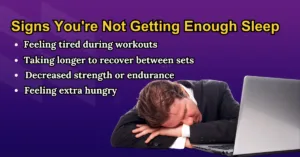
Feeling tired during the day, trouble focusing, mood swings, frequent yawning, and craving sugary foods are signs of not getting enough sleep. Poor memory and slow reaction times are also common. Watch out for these warning signs that show you need more sleep:
- Feeling tired during workouts
- Taking longer to recover between sets
- Decreased strength or endurance
- Feeling extra hungry
- Getting sick more often
- Mood changes
- Poor concentration
- Slower reaction time
How Exercise Affects Sleep
Exercise improves sleep by reducing stress, anxiety, and restlessness. It boosts sleep quality by helping you fall asleep faster and enjoy deeper, restorative rest, leading to better overall health and well-being. The connection between sleep and exercise functions both ways:
- Regular exercise can help you sleep better
- But timing matters:
- Morning and afternoon workouts usually improve sleep
- Late-night exercise might make it harder to fall asleep
- Give yourself at least 2-3 hours between exercise and bedtime
Sleep Quality Matters Too

Quality sleep is essential because it provides deep, restorative rest. It aids in muscle recovery, mental clarity, and overall well-being. It’s not just about sleep duration but also the quality of rest. Here are suggestions for more pleasing sleep quality:
1. Create a Good Sleep Environment
- Keep your bedroom cool (around 65-68°F/18-20°C)
- Make it as dark as possible
- Use earplugs or white noise if needed
- Get a comfortable mattress and pillows
- Use breathable bedding
2. Develop a Bedtime Routine
- Head to bed and wake up at the exact time daily
- Avoid screens 1 hour before bed
- Do gentle stretches or light reading
- Try deep breathing or meditation
- Keep your room quiet and peaceful
3. Watch What You Eat and Drink
- Don’t eat large meals close to bedtime
- Avoid caffeine after mid-afternoon
- Limit alcohol – it disrupts sleep quality
- Stay hydrated during the day, but not right before bed
How Sleep Helps Different Types of Training
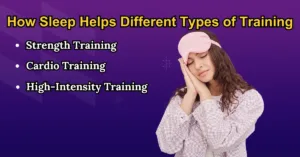
Sleep aids endurance training by boosting energy and stamina, while strength training, enhances muscle repair and growth. It also improves focus, balance, and coordination for skill-based activities.
1. Strength Training
- Deep sleep helps build and repair muscle
- Good sleep improves muscle strength
- It helps prevent training injuries
- Better sleep = better form and technique
2. Cardio Training
- Sleep improves endurance
- It helps your heart recover
- Good sleep maintains energy levels
- It helps your body adapt to training
3. High-Intensity Training
- Sleep helps prevent overtraining
- It supports quick recovery between sessions
- Good sleep maintains immune function
- It helps manage training stress
Tips for Athletes and Active People
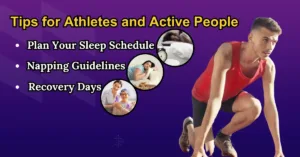
1. Plan Your Sleep Schedule
- Count backward from when you need to wake up
- Add 30 minutes to fall asleep
- Set a consistent bedtime
- Keep this schedule on weekends too
2. Napping Guidelines
- Keep naps to 20-30 minutes
- Nap before 3 PM
- Don’t sleep if you have a problem sleeping at night
- Use rests to make up for misplaced sleep
3. Recovery Days
- Utilize rest daytimes to catch up on sleep
- Sleep extra when training hard
- Listen to your body’s tiredness signals
- Don’t skip sleep for extra training
Common Sleep Problems for Active People
1. Overtraining and Sleep
- Too much training can hurt sleep
- Watch for signs of overtraining:
- Trouble falling asleep
- Waking up tired
- Restless sleep
- Racing thoughts at night
2. Travel and Sleep
- Plan for time zone changes
- Adjust sleep schedule gradually
- Use eye masks and earplugs
- Stay hydrated while traveling
3. Stress and Sleep
- Exercise can help manage stress
- But too much stress hurts sleep
- Try relaxation techniques
- Consider reducing training intensity if needed
When to Get Help
See a doctor if you have:
- Ongoing sleep problems
- Extreme tiredness
- Loud snoring
- Sleep apnea symptoms
- Insomnia that won’t go away
The Bottom Line
Good sleep is just as important as exercise and diet for fitness success. Make it a priority to:
- Get enough hours of sleep
- Create good sleep habits
- Listen to your body
- Adjust your schedule as needed
- Don’t sacrifice sleep for exercise
Remember that sleep isn’t lazy – it’s when your body does important repair work. Permit yourself to rest properly. Your fitness results will be better for it.
By making sleep a key part of your fitness plan, you’ll:
- Get better results from your workouts
- Recover faster
- Feel stronger
- Have more energy
- Stay healthier
- Reach your fitness goals faster
Start paying attention to your sleep today. Your body will thank you with a better performance tomorrow.
Conclusion
Sleep isn’t just rest time – it’s when your body gets stronger and repairs itself. Without good sleep, all your hard work in the gym won’t give you the best results. Aim for 7-9 hours of good type of sleep each night. Keep a regular sleep schedule, create a peaceful bedroom, and avoid late-night workouts. Remember: sleep is just as important as exercise and diet for getting fit and strong. Make sleep a top priority in your fitness journey, and you’ll see better results, feel stronger, and stay healthier.
FAQs
Why is sleep important for muscle recovery?
Sleep helps muscles repair and grow. During deep sleep, the body releases growth hormones, which rebuild damaged tissues, making muscles stronger and aiding faster recovery after workouts.
How does sleep affect workout performance?
Proper sleep improves focus, energy, and strength, which boosts workout performance. Lack of sleep leads to tiredness, affecting how well you exercise and reach fitness goals.
Can sleep help in reducing muscle soreness?
Yes, good sleep reduces muscle soreness. Restful sleep allows the body to heal damaged muscles, reducing pain and stiffness from intense exercise, and helping you feel fresher the next day.
How many hours of sleep should I get for fitness benefits?
Adults should aim for 7-9 hours of sleep. Quality rest ensures the body has enough time to recover and recharge, supporting better fitness and overall health.
Does lack of sleep affect weight loss?
Yes, poor sleep can slow down weight loss. It affects hunger hormones, causing cravings and overeating. Proper sleep helps maintain a balanced metabolism, aiding better weight management.
Also Read:
5 Tips: Basic Workout Plans for People Starting Their Fitness Journey, Focusing on Long-Term Health
How Practicing Mindfulness Can Improve Mental Health and Well-being
References:
https://en.wikipedia.org/wiki/Sleep
https://pmc.ncbi.nlm.nih.gov/articles/PMC8072992/
https://pmc.ncbi.nlm.nih.gov/articles/PMC10503965/
Disclaimer:
The information provided on the role of sleep in fitness and recovery is for educational purposes only and should not be considered medical advice. Always consult a healthcare professional before making changes to your sleep or fitness routine.
Related post
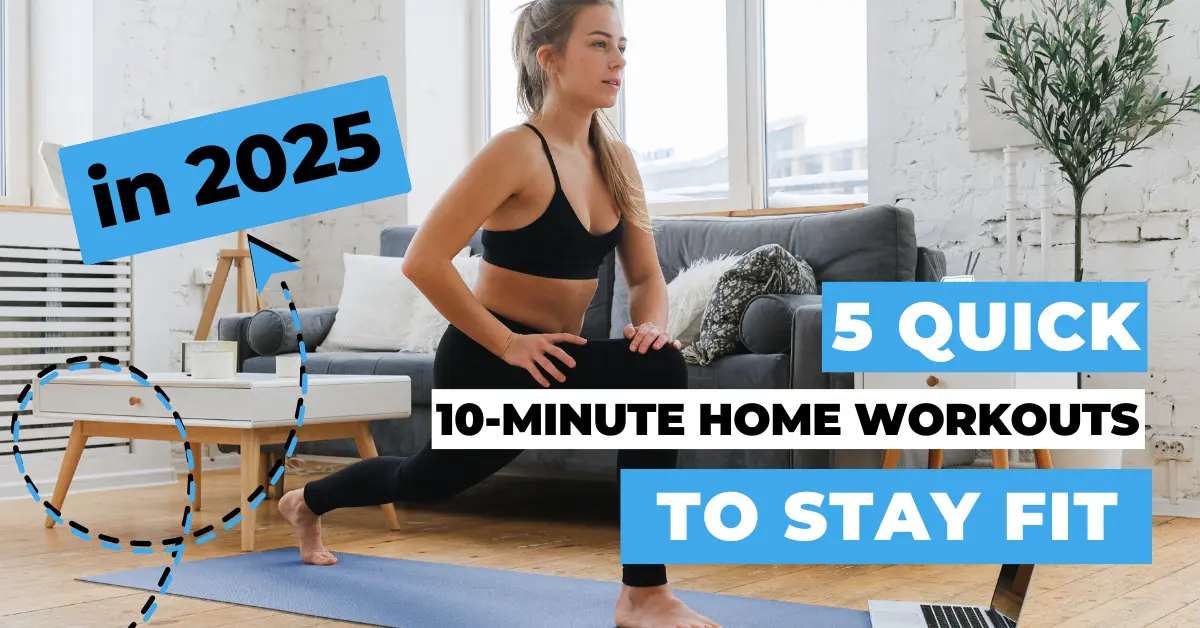
5 Quick 10-Minute Home Workouts to Stay Fit in 2025
